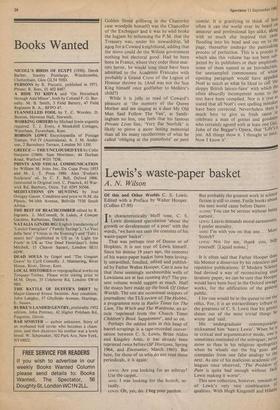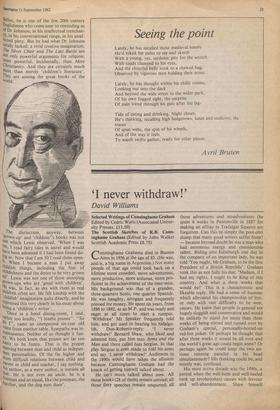Lewis's waste-paper basket
A. N. Wilson
Of this and Other Worlds C. S. Lewis. Edited with a Preface by Walter Hooper. (Collins £7.95)
In characteristically bluff tone, C. S. Lewis dismissed speculation 'about the growth or development of a poet' with the words, 'we have not seen the contents of his waste-paper basket'.
That was perhaps true of Donne or of Hopkins. It is not true of Lewis himself. Since his demise 19 years ago, the contents of his waste-paper basket have been loving- ly unravelled, fondled, edited and publish- ed by Father Walter Hooper. Can it now be that these seemingly inexhaustible wells of Lewisiana are at last running dry? The pre- sent volume would suggest as much. Half the essays here made up the book Of Other Worlds. The rest are occasional snippets of journalism: the TLS review of The Hobbit, a programme note in Radio Times for The Lion, The Witch and The Wardrobe, an ar- ticle 'reprinted from the Church Times Children's Book Supplement', and so on.
Perhaps the oddest item in this heap of barrel-scrapings is a tape-recorded conver- sation between C. S. Lewis, Brian Aldiss and Kingsley Amis. It has already been reprinted twice before (SF Horizons, Spring 1964, and Encounter, March 1965). But here, for those of us who do not read those periodicals, it is again: Lewis: Are you looking for an ashtray? Use the carpet.
Amis: I was looking for the Scotch, ac- tually.
Lewis: Oh, yes, do. I beg your pardon ...
But probably the greatest work in science fiction is still to come. Futile books about the next world came before Dante.. • ALDISS: You can be serious without being earnest.
LEWIS: Leavis demands moral earnestness, I prefer morality. AM is: I'm with you on that one... More Scotch?
LEWIS: Not for me, thank you, help yourself. [Liquid noises.] It is often said that Father Hooper does his Mentor a disservice by his relentless and repetitive publications. If Modern Science had devised a way of reconstituting used lavatory paper, we can be sure that Hooper would have been busy in the Oxford sewage. works, for the edification of the general public. I for one would be in the queue to see the relics. For, it is an extraordinary tribute to the greatness of C. S. Lewis that his genius shines out of the most trivial things he wrote and said.
His undergraduate contemporaries nicknamed him 'heavy Lewis'. When he is in critical and argumentative mode, one i5 sometimes reminded of the sobriquet, never more so than in his religious apologetic; when he wheels out the big guns and stampedes from one false analogy to the next. As one of his malicious academic col- leagues once observed, 'The Problem of Pain is quite bad enough without Jack Lewis making it worse'. This new collection, however, reminds us of Lewis's very rare combination of qualities. With Hugh Kingsmill and Hilaire Relloc, he is one of the few 20th century Englishmen who come near to reminding us of Dr Johnson, in his intellectual trenchan- cy, in his conversational range, in his unaf- fected piety. But he had what Dr Johnson totally lacked: a vivid creative imagination. The Silver Chair and The Last Battle are not only powerful arguments for religion: More powerful, incidentally, than Mere Christianity. And they are certainly much more than merely `children's literature'. They are among the great books of the The distinction, anyway, between grown-up' and `children"s books was not one which Lewis observed. 'When I was ten, 1 read fairy tales in secret and would have been ashamed if I had been found do- ;11g so. Now that I am 50 I read them open- q`. When 1 became a man I put away childish things, including the fear of childishness and the desire to be very grown 1113'• Lewis was not one of those annoying grown-ups who are 'good with children'.
,
'le was, in fact, as shy with them as real children often are. He felt kinship with the childish' imagination quite directly, and he expressed this very clearly in his essay about being a 'children's writer'.
`Once in a hotel dining-room, I said. rather too loudly, "I loathe prunes". "So d0 I'', came an unexpected six-year old voice from another table. Sympathy was in- stantaneous. Neither of us thought it fun- tlY. We both knew that prunes are far too nasty to be funny. That is the proper meeting between man and child as indepen- dent personalities. Of the far higher and more difficult relations between child and parent or child and teacher, I say nothing. An author, as a mere author, is outside all that. He is not even an uncle. he is a freeman and an equal, like the postman, the libutcher, and the dog next door'.



































 Previous page
Previous page